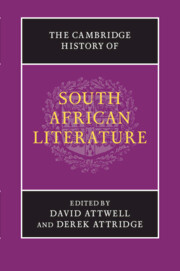Book contents
- Frontmatter
- Introduction
- PART I ORATURES, ORAL HISTORIES, ORIGINS
- PART II EXPLORATION, EARLY MODERNITY AND ENLIGHTENMENT AT THE CAPE, 1488–1820
- PART III EMPIRE, RESISTANCE AND NATIONAL BEGINNINGS, 1820–1910
- PART IV MODERNISM AND TRANSNATIONAL CULTURE, 1910–1948
- 14 Black writers and the historical novel: 1907–1948
- 15 The Dertigers and the plaasroman: two brief perspectives on Afrikaans literature
- 16 New African modernity and the New African movement
- 17 Refracted modernisms: Roy Campbell, Herbert Dhlomo, N. P. van Wyk Louw
- 18 The metropolitan and the local: Douglas Blackburn, Pauline Smith, William Plomer, Herman Charles Bosman
- PART V APARTHEID AND ITS AFTERMATH, 1948 TO THE PRESENT
- PART VI SOUTH AFRICAN LITERATURE: CONTINUITIES AND CONTRASTS
- Index
- References
14 - Black writers and the historical novel: 1907–1948
from PART IV - MODERNISM AND TRANSNATIONAL CULTURE, 1910–1948
Published online by Cambridge University Press: 28 January 2012
- Frontmatter
- Introduction
- PART I ORATURES, ORAL HISTORIES, ORIGINS
- PART II EXPLORATION, EARLY MODERNITY AND ENLIGHTENMENT AT THE CAPE, 1488–1820
- PART III EMPIRE, RESISTANCE AND NATIONAL BEGINNINGS, 1820–1910
- PART IV MODERNISM AND TRANSNATIONAL CULTURE, 1910–1948
- 14 Black writers and the historical novel: 1907–1948
- 15 The Dertigers and the plaasroman: two brief perspectives on Afrikaans literature
- 16 New African modernity and the New African movement
- 17 Refracted modernisms: Roy Campbell, Herbert Dhlomo, N. P. van Wyk Louw
- 18 The metropolitan and the local: Douglas Blackburn, Pauline Smith, William Plomer, Herman Charles Bosman
- PART V APARTHEID AND ITS AFTERMATH, 1948 TO THE PRESENT
- PART VI SOUTH AFRICAN LITERATURE: CONTINUITIES AND CONTRASTS
- Index
- References
Summary
The start of the twentieth century witnessed the first explorations of the novel form by black South African writers. Between 1907 and 1948 many important novels were published that despite their various themes seemed predicated on some degree of engagement with aspects of South Africa's complex and contested history. Amongst many other concerns, three historical developments informed the dominant concerns of the novelists. The first was the large-scale social upheaval, migration and dislocation that occurred across southern Africa in the early decades of the nineteenth century and that is referred to as the mfecane. The second was the final defeat of the last independent African polities in the decades before the end of the nineteenth century and their replacement with neotraditional forms of authority under the patronage of colonialism. Then there was the formation of Union in 1910 with the unification of the four colonial provinces into a unitary state. Union consolidated the development of South Africa as a society structured on racial dominance and exploitation and typified by various forms of dispossession and disenfranchisement that afflicted Africans in the twentieth century. It is not surprising, then, that parts of the thematic subtexts of many of the novels reflect on the ways in which the African elite should construct its senses of group and class identity and aspirations, especially in relation to the chiefly classes and colonial administrators.
- Type
- Chapter
- Information
- The Cambridge History of South African Literature , pp. 287 - 307Publisher: Cambridge University PressPrint publication year: 2012
References
- 5
- Cited by



